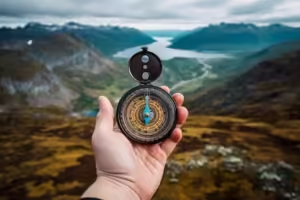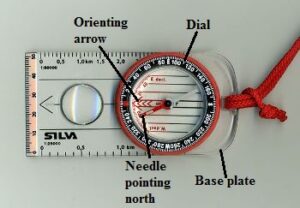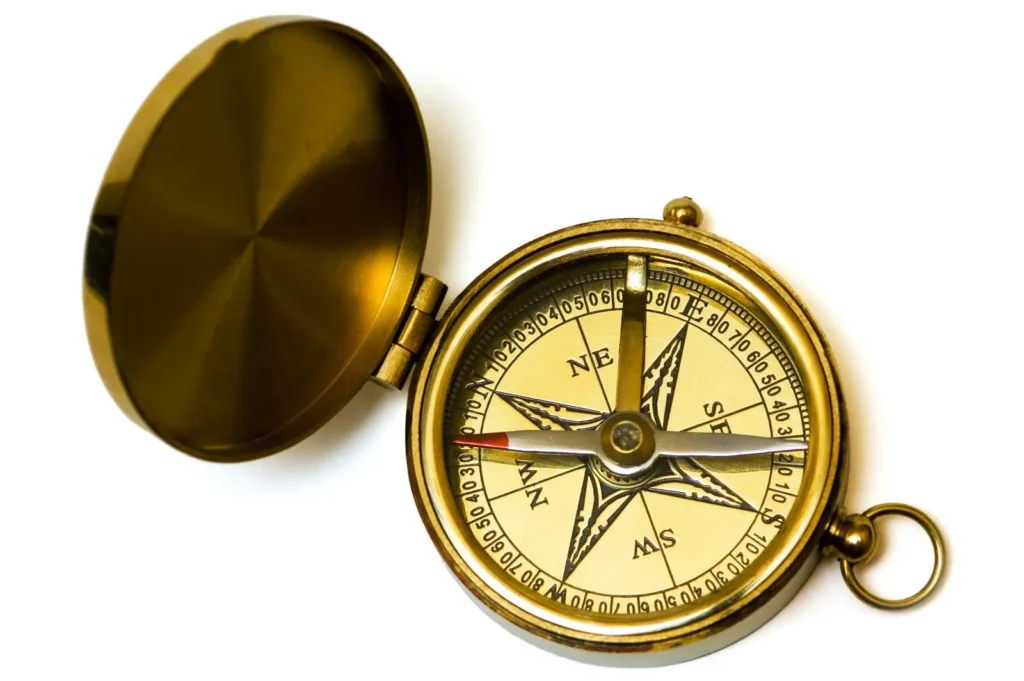Have you ever wondered about the compass medium and what it means? A compass medium is a special tool that helps us understand directions and find our way. Imagine having a magical device that shows you which way is north, south, east, and west!
In this blog post, we will explore everything you need to know about the compass From how it works to why it’s so important, you’ll learn all about this amazing tool. So, let’s get started on our journey to discover the secrets of the compass medium!
What Is a Compass Medium
A compass medium is a tool that helps us figure out which direction we are going. It is usually a small device with a needle that points north. This tool is really helpful for finding your way when you are exploring new places or hiking in the woods.
Most compasses are round and have a special needle that moves. This needle always points towards the north, so you can use it to find other directions like east, south, and west. Understanding how a compass works can make traveling and outdoor adventures much easier.
Explorers and adventurers have used the compass for hundreds of years. It’s one of the oldest tools for navigation and is still important today. Even with modern technology, a compass can be a reliable way to find your way.
How Does a Compass Medium Work
The compass medium works by using a magnetic needle that always points north. This is because the Earth has a magnetic field, and the needle is attracted to it. When you hold the compass level, the needle will show you which way is north.
To use a compass you first need to hold it flat in your hand. Then, wait for the needle to stop moving. The needle will point to the north, and you can use this to figure out other directions. Knowing how to read a compass is a valuable skill for anyone who enjoys outdoor activities.
In addition to helping with directions, a compass can be used to map out your route. By following the needle and using a map, you can travel to different places and always know where you are going. It’s a simple yet powerful tool for navigation.
The History of the Compass Medium
The compass medium has a long history that dates back to ancient times. It was first used in China over a thousand years ago. Early compasses were made from lodestone, a type of magnetic rock that attracted iron.
Over time, the compass was improved and became more accurate. By the 15th century, it was used by explorers like Christopher Columbus to find new lands. The compass helped sailors navigate the seas and discover new places.
Today, the compass is still used in various fields, from hiking to aviation. Despite modern technology, its simple design and effectiveness make it a lasting tool for finding directions. Learning about the history of the compass can give you a greater appreciation for this amazing invention.
Why a Compass Medium Is Useful for Navigation
A compass medium is extremely useful for navigation because it helps you find your way even when you can’t see landmarks. Whether you are in a forest, on a mountain, or lost in a city, a compass can guide you to your destination.
When you use a compass you always know which direction is north. From there, you can figure out other directions and plan your route. This is especially helpful if you are exploring new areas or need to get back to a specific location.
Moreover, a compass doesn’t need batteries or electricity. This means it will always work as long as you have it with you. It’s a dependable tool that can be used in any situation, making it a must-have for anyone who loves adventures.
Different Types of Compass Mediums
There are several types of compass mediums available, each designed for different uses. Some compasses are made for hikers and come with additional features like a thermometer or a barometer. Others are simple and just show the basic directions.
One common type is the handheld compass, which is easy to carry and use. Another type is the baseplate compass, which has a flat base and is used for map reading. There are also digital compasses that use electronics to provide directions.
Choosing the right compass depends on what you need it for. If you are an outdoor enthusiast, you might want a compass with extra features. For simple navigation, a basic compass might be all you need. Each type has its advantages and can help you in different situations.
How to Use a Compass Medium Correctly

Using a compass medium correctly is important to get accurate directions. First, hold the compass flat and level in your hand. This helps the needle move freely and point accurately.
Next, let the needle settle and point north. Once it’s steady, you can see which direction you need to go. If you are using a map, line up the compass with the map’s north to find your route. Practice makes perfect, so try using your compass in different places to get better.
Remember to keep the compass away from metal objects, as they can affect its accuracy. By following these tips, you can use your compass effectively and always find your way.
Fun Facts About the Compass Medium
The compass medium has some interesting facts that make it even more fascinating. For example, did you know that the needle in a compass is made of a magnetic material? This helps it point north and make navigation easier.
Another fun fact is that early compasses were made from pieces of lodestone, which is a natural magnet. Over time, compasses evolved to become more accurate and reliable. Modern compasses are still based on the same basic principles but are often much more advanced.
The compass also played a crucial role in exploration. Many famous explorers, including Magellan and Vasco da Gama, relied on it to navigate their voyages. Learning these fun facts can give you a new appreciation for this incredible tool.
Compass Medium vs. GPS: What’s the Difference
The compass medium and GPS are both used for navigation, but they work in different ways. A compass uses the Earth’s magnetic field to show directions, while GPS uses satellites to pinpoint your location.
One key difference is that a compass doesn’t require batteries or electricity. You can use it anywhere, even in remote areas. On the other hand, GPS devices need power and can sometimes lose signal if you are in a place with poor reception.
Both tools are useful in different situations. A compass is great for basic navigation and can be used without technology. GPS provides precise location data and is helpful for more advanced navigation tasks. Understanding these differences can help you choose the best tool for your needs.
The Science Behind the Compass Medium
The compass medium works because of the Earth’s magnetic field. This field is created by the movement of molten iron in the Earth’s outer core. The compass needle is made of a magnetic material and aligns itself with this field, pointing north.
The magnetic field of the Earth is very strong and consistent. This is why the compass is such a reliable tool for navigation. Even when you are far from familiar landmarks, the compass needle will still point north, helping you find your way.
Learning about the science behind the compass can help you understand how it works. It’s amazing to think that a simple tool can be so effective because of the Earth’s magnetic forces. This knowledge makes using a compass even more impressive.
Choosing the Right Compass Medium for You
Choosing the right compass medium depends on what you need it for. If you are an avid hiker, look for a compass with extra features like a built-in map or a sighting mirror. These features can help you navigate more accurately.
For casual use or simple navigation, a basic handheld compass might be enough. It’s easy to carry and use, making it perfect for everyday adventures. Make sure to choose a compass that suits your needs and is easy for you to use.
Testing different compasses and reading reviews can help you make the best choice. Remember that the right compass medium can make your outdoor experiences more enjoyable and less stressful.
Common Mistakes When Using a Compass Medium
When using a compass medium, there are some common mistakes to avoid. One mistake is holding the compass too close to metal objects, which can interfere with the needle. Always keep the compass away from things like phones or keys.
Another mistake is not holding the compass level. If the compass is tilted, the needle might not point accurately. Make sure to keep the compass flat and steady while using it. Practice will help you get better at reading the compass correctly.
Also, be aware of magnetic interference from electrical devices. These can affect the accuracy of the compass medium. By avoiding these mistakes, you can use your compass more effectively and confidently.
How a Compass Medium Can Help in Outdoor Adventures
A compass medium is a great tool for outdoor adventures. Whether you are hiking in the mountains or exploring a new city, a compass can help you stay on track. It shows you which way is north, so you can find your way to different destinations.
Using a compass medium is also helpful when you are in areas with limited visibility. If you are in the fog or at night, the compass can guide you safely. It’s a reliable tool that doesn’t depend on technology or weather conditions.
Having a compass with you on adventures gives you peace of mind. You can explore new places with confidence, knowing that you have a reliable way to find your way. The compass medium is an essential tool for any outdoor enthusiast.
The Evolution of the Compass Medium
The compass medium has changed a lot over the years. A long time ago, people used simple magnetic rocks called lodestones. These rocks would naturally point north, helping early navigators find their way.
Later, the design of the compass medium improved. By the 11th century, the Chinese had developed a more advanced compass with a needle that floated on water. This made it easier to use and more accurate. Over time, other cultures adopted and improved the compass, adding features like dials and graduations for better precision.
In modern times, the compass medium has become more refined. Today’s compasses are often made with durable materials and come with additional features like adjustable declination and built-in mirrors. Despite all the technological advancements, the basic principles of the compass medium remain the same. Understanding its evolution can give you a greater appreciation for how this tool has helped explorers and travelers throughout history.
How to Care for Your Compass Medium
Taking care of your compass medium is important to keep it working properly. First, make sure to keep it clean. Dirt or grime can affect the compass needle’s movement. Use a soft cloth to wipe the compass regularly and keep it free from dust.
Second, store your compass medium in a safe place. Avoid putting it near metal objects or electronic devices, as these can interfere with its accuracy. Keeping the compass in a protective case can also help prevent damage.
Third, check the compass regularly to make sure it’s working correctly. If the needle doesn’t move smoothly or if the compass seems off, it might need to be recalibrated or replaced. Proper care will ensure your compass medium remains a reliable tool for all your navigation needs.
Compass Medium in Modern Navigation
The compass medium is still relevant even with modern navigation tools like GPS. Many people use a compass as a backup in case their electronic devices fail. It’s especially useful in areas where GPS signals might be weak or unreliable.
In addition to being a backup tool, the compass medium can also complement modern navigation systems. For example, if you’re using a GPS for precise location data, you can use a compass to verify directions and ensure you’re on the right path.
Many outdoor enthusiasts and professionals continue to use the compass medium because it’s simple, reliable, and doesn’t depend on batteries or technology. Understanding how to use a compass alongside modern tools can make you a more skilled navigator and prepared for any situation.
Compass Medium in Emergency Situations
In emergency situations, a compass medium can be a lifesaver. If you find yourself lost or disoriented, a compass can help you regain your bearings and find a safe route. It’s a dependable tool that works even when other navigation aids might fail.
When using a compass in emergencies, remember to stay calm and use the compass correctly. Hold it flat, let the needle settle, and determine the direction you need to go. This can help you make decisions about which way to travel and how to get to safety.
Having a compass medium in your emergency kit is a smart idea. It’s a simple tool that can provide critical assistance when you need it most. Knowing how to use it effectively can make a big difference in challenging situations.
How a Compass Medium Helps in Orienteering
Orienteering is a sport that combines running and navigation using a map and a compass medium. The goal is to find specific locations marked on a map as quickly as possible. The compass medium is essential for determining directions and finding your way through different terrains.
In orienteering, you use the compass to align the map with the terrain. By following the directions indicated by the compass, you can navigate accurately and efficiently. This helps you stay on track and reach your destinations faster.
Orienteering is a fun and challenging activity that requires skill and practice. Learning how to use the compass medium effectively can improve your performance and make the sport more enjoyable. It’s a great way to develop your navigation skills and enjoy outdoor adventures.
The Role of Compass Medium in Survival Skills
A compass medium is an important part of survival skills training. In survival situations, knowing how to navigate without relying on technology is crucial. The compass medium provides a reliable way to find directions and navigate through unfamiliar areas.
When learning survival skills, you practice using a compass to determine your location and plan your route. This includes understanding how to use the compass in different conditions, such as low visibility or challenging terrain. Mastering these skills can help you stay safe and find your way in emergencies.
Incorporating the compass medium into your survival training can give you confidence and prepare you for a variety of situations. It’s a valuable tool that enhances your ability to navigate and survive in the wild.
Compass Medium for Kids: Fun and Educational Activities

A compass medium can be a fun and educational tool for kids. There are many activities and games that help children learn how to use a compass and understand directions. For example, you can create a scavenger hunt where kids use a compass to find hidden objects.
Another activity is a compass-based treasure hunt, where kids follow compass directions to discover a “treasure” or prize. These activities teach kids basic navigation skills and introduce them to the concept of using a compass medium.
Using a compass in playful ways can make learning about navigation exciting and enjoyable for children. It’s a great way to encourage outdoor exploration and develop important skills in a fun and engaging manner.
The Benefits of Using a Compass Medium in Education
In education, a compass medium offers several benefits. It helps students understand basic concepts of geography, magnetism, and navigation. Learning to use a compass can also enhance problem-solving and critical thinking skills.
Teachers can incorporate the compass medium into lessons about directions, maps, and the Earth’s magnetic field. Hands-on activities with a compass make learning more interactive and memorable. Students can practice using a compass to follow directions, plot locations, and understand geographical concepts.
Using a compass medium in education encourages students to engage with the material in a practical way. It provides a tangible connection to the concepts being taught and helps students develop useful skills for the future.
Comparing Different Brands of Compass Mediums
When choosing a compass medium, it’s helpful to compare different brands and models. Each brand may offer unique features, such as different scales, sighting options, or durability. Comparing these features can help you find the best compass for your needs.
Some popular brands offer compasses designed for specific activities, like hiking or marine navigation. Look for reviews and recommendations to see which brands are known for their quality and reliability. Checking out different models and their features can help you make an informed decision.
Finding the right compass medium for your needs involves considering factors like accuracy, ease of use, and additional features. Taking the time to compare options ensures you choose a compass that will serve you well in various situations.
Conclusion
The compass medium is a simple but powerful tool that helps us find our way. It has been used for centuries, from ancient magnetic rocks to modern compasses with cool features. Whether you’re exploring the outdoors or just learning about navigation, understanding how a compass works can be really helpful.
Using a compass is not only fun but also a valuable skill. It can guide you on adventures, help you in emergencies, and make learning about directions exciting. So next time you pick up a compass, remember how important and amazing this little tool is for finding your way!

